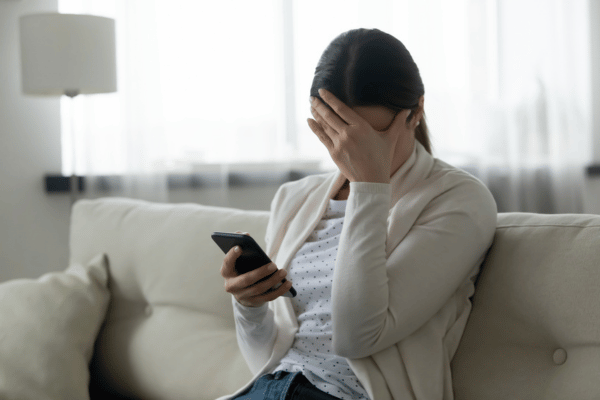As the fourth instalment of the eagerly anticipated misadventures of Bridget Jones hit the box office on the weekend, fans watched Bridget navigate a new world of dating after the death of her husband, Mark Darcy. Here our therapists share their tips on finding love after loss and whether there’s ever a ‘right time’.
“We never get over losing someone we love but we learn to live without them and that can, in time, help you realise you may have some emotional and physical capacity for someone else,” shares senior accredited therapist Dee Johnson.
Guilt is a natural emotion
Dee says that for some, contemplating finding a new relationship can evoke feelings of deep shame, guilt and even fear. “The fear of being disloyal to your deceased partner can genuinely feel that you are cheating on them. There’s also the fear of other people’s criticism and rejection from friends and family if you do move on.”
Registered relationship therapist and coach, Susie Masterson says guilt is a common but natural emotion following the death of a loved one. “In the film, we learn how Mark Darcy died in an accident on a humanitarian project. If our partner dies whilst at work or away from home, this can also bring up feelings of rejection and abandonment,” explains Susie. “For those left behind, life becomes a series of ‘firsts’ without their partner, parent, or friend.”
Accredited grief therapist, Sara Mathews says that if, like Bridget, you meet and fall in love with someone new it’s likely that you will experience the complicated business of loving two people at once. “It can be helpful to notice that love for the person who has died does not get any less if you find yourself loving someone new. The new person's love comes from a different time and a different part of you,” explains Sara.
Here are our therapists’ tips for finding love after loss:
-
Take your time
“If you’ve lost someone you’ve dearly loved, you’ll have a big gap in your life. Many of us long to regain that intimacy and closeness but I’d suggest that might be a mistake,” shares Lulu Sinclair, an accredited grief therapist. Lulu says that although it’s tempting to try to fill that gap you need time to grief, to reflect, to remember and to feel. “It will of course depend on how your beloved died – whether it was sudden or not,” she explains.
-
Consider your motivation
Dee says it’s important to be clear about your motivation to start dating again. “Ask yourself what it is you need right now. Is it a companion, intimacy, just someone for sex and fun but no conscious intention of an emotional relationship developing, or are you ready and would really like love back in your life as a new chapter but never a replacement?”
-
Ensure you’re in a strong frame of mind
Although Lulu says it’s important not to rush getting into a new relationship, it’s also important to be open and receptive to the idea. “If you rush, you’re likely to choose someone for the wrong reasons - then you’ll have trickier moments when you need to untangle yourself. You need to be in a strong frame of mind to make a wise choice but, also if it turns out that it’s not as you’d first thought, you need to be strong enough to change your mind,” shares Lulu.
-
Become your own best friend
Sara says that it’s vital that you focus on yourself in this phase. “If you’re out and you feel like going home, go home. If you feel like changing your mind about an engagement that's OK too,” says Sara. That said, Sara asserts that you will have to learn to tolerate a bit of discomfort. “This can be exciting but it's also stressful and tiring,” she adds. “Your inner best friend can keep an eye on the balance between these things on your behalf, learn to trust their judgment.”
5. Accept that things will never be the same
Sara says that the death of a loved one changes us. “You need to check in with yourself and become curious about what you value, enjoy and want in your life now. Human beings are like plants. We are meant to grow and develop. Get curious about who you are becoming,” says Sara.
-
Say yes to invitations and opportunities
Sara suggests that not only will this widen your social circle and increase your chances of meeting someone new, but it will also help you to become accustomed to socialising and doing things that feel unfamiliar.
-
Show yourself, and others, empathy
“If someone is being judgmental and unkind to you about your choices about finding love again, try to offer them tolerance and understanding. It is one of the strange ironies of bereavement that those most effected often end up helping other people to manage their feelings as well having to manage their own,” shares Sara.
-
You don't need to tell everybody everything
If you do find yourself in a new relationship Sara says it’s important to maintain privacy and see how things go before announcing your new status to the world. “It is useful to remember that your timescale for change is likely to be different from anyone else's,” she says.
-
Find someone who will honour your former partner
Grieving people are sometimes frightened that if they see someone "moving on", the deceased person will be forgotten. “Offer reassurance to friends, family and children that you will never forget the person you lost,” says Sara. She also suggests that sometimes sharing the ways in which you remember that person also can be very comforting. For example, "whenever I hear that song I think of him.”
Dee agrees and says it’s important to ensure you find someone who will not dismiss your deceased partner. “Find someone who wants to know about them, acknowledge them and honour them,” shares Dee.
-
Don’t compare
Dee also says it’s unfair to your new dating partner to make comparisons - and may be a sign that perhaps you are not as ready as you thought you were. “Finding a new love after loss should be about exactly that - finding new love, not a replacement,” says Dee.
-
Talk about your loss
Dee, and all of our therapists, agree that talking through your honest turmoil of emotions can help you come to terms with what you need. “If you’re feeling raw, remember that this will change - so don’t pressure yourself to have to make and heavy permanent decisions if you don’t feel ready.” If you feel it would help talking to a trained and registered grief counsellor, visit BACP’s therapists directory.
Is there ever a right time to find love again?
Lulu says there is never a “right” time to move on, but you will know when it’s right because you will feel it. “You will wake up one day and the load will be just that little bit lighter. You will notice things that have been a blur all through your grieving process and you will begin to get perhaps a momentary sense of delight or pleasure from what is around you. You are likely to continue to feel sad for some time to come, but it will not be as deep as it once was.”
Susie agrees and says: “The best thing about making a decision is that if we don’t like the consequences, we can always make another one. After all, life is an experiment. There is no right and wrong. No failure. Just learning. I always say to my clients that the best decisions we make are the ones that we make for ourselves.”
To find a registered therapist who can support you visit our therapist directory.

Eight tips for sharing grief online and how to support others
For National Grief Awareness Week, our members discuss how social media is changing the way we grieve and how to safely share your feelings online.

9 ways to cope with grief during the holiday season
Our members share their best strategies for coping with grief

Bereavement
How do you cope with the death of a loved one? How can you deal with the overwhelming feelings of loss and grief? BACP member Sara Mathews explains how counselling can help.
